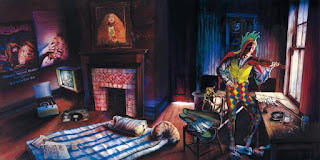This is actually a jewel, one of the best prog songs of the '90s, IMHO. It's an instrumental track, full of nostalgy and with a scent of Trespass era Genesis. The folk influence is present (the title itself is the name of a spontaneous plant, the "fumaria" or fumitory in English), melt with all the 70s sound you can desire. The winning point is the perfect balance of acoustic and electric instruments, producing a sweet but not sweetish athmosphere. And it's not an useless replica of the golden era songs: the volume and tempo changes give its own character to the track, along with that northern, crepuscular touch.
Änglagård in their '90s lineup.
All the "Hybris" album is a gem, to say the truth, and this track is maybe its most representative one, summing up all the best qualities of the group. A never compromising but always enjoyable progressive rock song.










